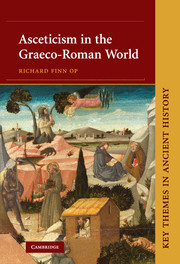Book contents
1 - Pagan asceticism: cultic and contemplative purity
Published online by Cambridge University Press: 22 January 2010
Summary
THE OLYMPICS OF THE SOUL
Shortly after the death of the Neoplatonist philosopher Plotinus (C. ad 250–70), his pupil and literary executor Porphyry (AD 234–c.???) urged another member of the school, the wealthy Roman Castricius Firmus, to join him in renewed intellectual endeavour: they should together ‘go stripped, without tunics, to the stadium, to compete in the Olympics of the soul’. Porphyry understood the goal of philosophy as that contemplation in the soul of divine truth which was also an act of union with the divine. The athletic metaphor of his appeal to the dedicatee of On Abstinence, and through him to its readership, glorified both the goal and the philosopher who attained it; the image bestowed on the latter the prestige of victory in these most famous of all Greek games, and something of the victor's numinous power. The metaphor further located this goal as the fruit of a strict training (in Greek ascesis) comparable to the diet, sexual abstinence, and exercises of the naked Olympic athlete. It was an apt metaphor in as much as the philosopher had to divest his mind of the multiple concerns and passions which distracted it through its relationship to the body; such concentration could easily be envisaged as a stripping naked of the self, because Plato had long since characterized the body as clothing worn by the soul. The figure was all the more apt in so far as the disciplined training which Porphyry thought would facilitate contemplation involved, amongst other things, a daily practice of ascetic abstention in matters of diet, sexual activity, wealth, and wider social intercourse, all elements in a thoroughgoing detachment from the material and mortal.
- Type
- Chapter
- Information
- Asceticism in the Graeco-Roman World , pp. 9 - 33Publisher: Cambridge University PressPrint publication year: 2009



